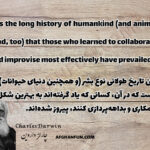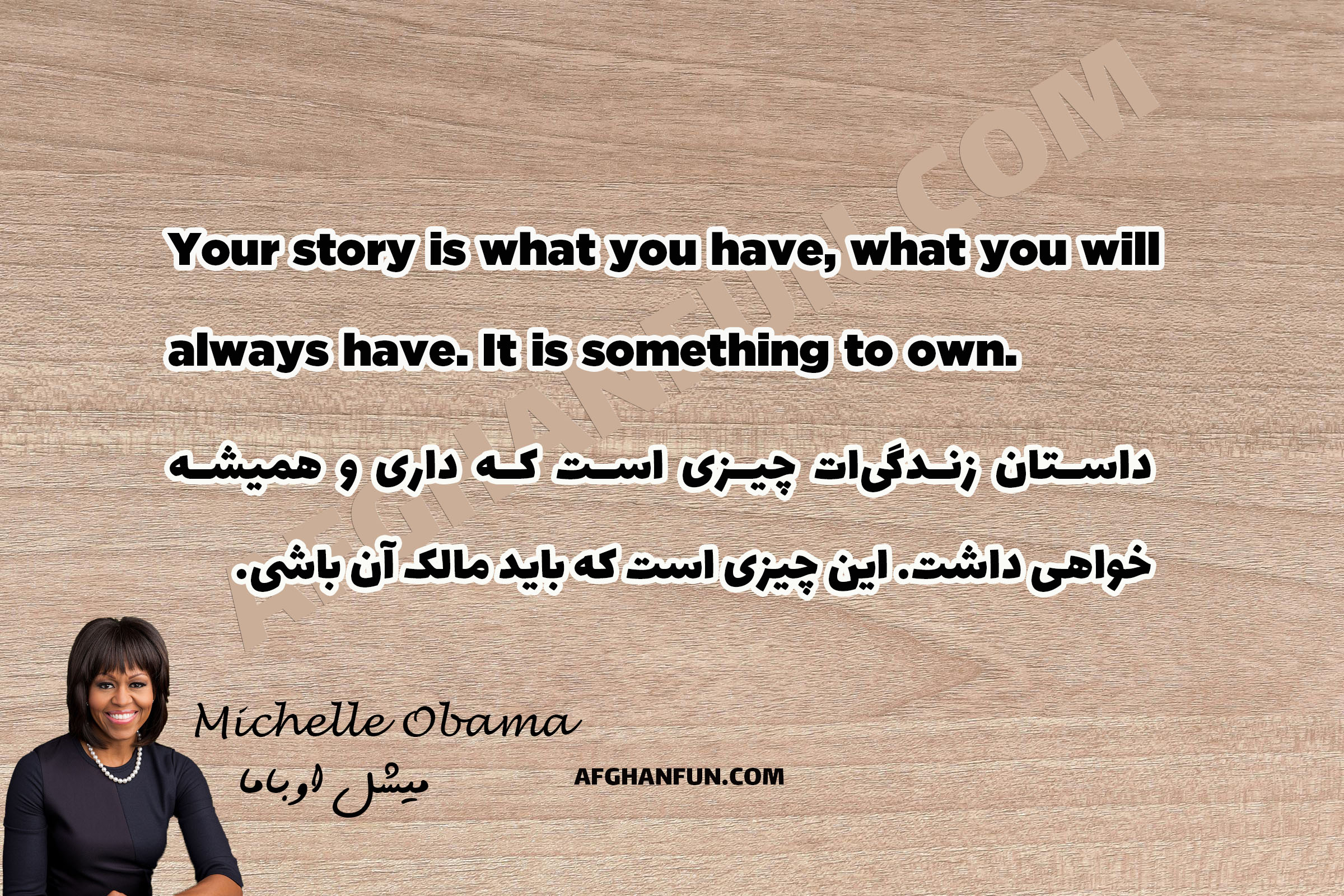Michelle Obama Quote: How to Own Your Story and Thrive
Your story is what you have, what you will always have. It is something to own.
Michelle Obama
داستان زندگیات چیزی است که داری و همیشه خواهی داشت. این چیزی است که باید مالک آن باشی.
میشل اوباما
این نقل قول به اهمیت داستان زندگی هر فرد اشاره دارد. داستان شما مجموعهای از تجربیات، باورها و هویت شماست که همیشه با شما باقی میماند. این دارایی شخصی چیزی است که باید به آن افتخار کنید و آن را متعلق به خود بدانید، زیرا هیچکس دیگری نمیتواند آن را از شما بگیرد.
Ҳикояи зиндагии ту он чизест, ки дорӣ ва ҳамеша хоҳӣ дошт. Ин чизест, ки бояд онро соҳиб бошӣ.
Мишел Обама
Ин иқтибос аҳамияти достони ҳаёти шахсиро таъкид мекунад. Достони шумо маҷмӯи таҷрибаҳо, эътиқодҳо ва ҳувияти шумост, ки ҳамеша бо шумо мемонад. Ин як сарвати шахсист, ки бояд ба он ифтихор кунед ва онро аз они худ донед, зеро ҳеҷ кас онро аз шумо гирифта наметавонад.
قصتك هي ما لديك، وما ستملكه دائمًا. إنها شيء يجب أن تمتلكه.
ميشيل أوباما
هذا الاقتباس يبرز أهمية قصة حياة كل شخص. قصتك هي مجموعة من تجاربك ومعتقداتك وهويتك التي ستظل معك دائمًا. إنها ملكك الشخصي الذي يجب أن تفخر به وتعتز به، لأنه شيء لا يمكن لأي أحد أن يسلبه منك.
Michelle Obama’s quote, “Your story is what you have, what you will always have. It is something to own,” is a powerful reflection on the importance of personal identity, experience, and the value of one’s unique narrative. Let’s break it down:
1. “Your story is what you have”:
This part of the quote emphasizes the singular and unshakeable nature of our personal histories. Our “story” refers to the collection of experiences, challenges, triumphs, and moments that make us who we are. No matter where life takes us, our personal story is always with us—it is the core of our identity. Unlike material possessions or external achievements that can be lost, stolen, or diminished, our story is something uniquely ours, shaped by our past and lived through our own perspective.
Implication: The quote encourages us to recognize the inherent value in our lived experiences, regardless of how others may perceive or judge them. It suggests that our personal history, no matter how humble or complex, is an essential part of who we are.
2. “What you will always have”:
Here, Michelle Obama is underscoring the permanence of one’s personal story. Unlike fleeting moments or external circumstances that can change, our story remains with us throughout our lives. Even if everything else changes—relationships, careers, or even our physical appearance—our story stays constant. It is a source of resilience because it is something that cannot be taken away from us.
Implication: This aspect of the quote is a reminder of the strength and constancy that comes from embracing one’s history. It highlights the idea that even in the face of hardship or uncertainty, the personal narrative we carry is a source of inner stability.
3. “It is something to own”:
The final part of the quote encourages ownership and agency over one’s story. To “own” your story means to take full responsibility for it, to accept it without shame or regret, and to be proud of the experiences that have shaped you. It’s an invitation to embrace the power of your narrative, regardless of how others may view it.
Implication: Ownership of one’s story is an act of self-empowerment. It’s about taking control of the narrative and not allowing others to define or limit it for you. For Michelle Obama, this could also be interpreted as a call for individuals, particularly those who have faced adversity or marginalization, to assert their voice and not let society’s judgments or stereotypes diminish the value of their experiences. To own one’s story is to take pride in one’s journey, with all its ups and downs.
4. The Significance of Storytelling:
In many cultures and traditions, storytelling is an essential means of transmitting knowledge, culture, and wisdom. Personal stories often hold emotional power because they reflect universal human experiences: love, struggle, joy, loss, and resilience. By owning our story, we contribute to a larger collective narrative that is diverse, complex, and rich in meaning. Michelle Obama’s quote reminds us that storytelling is not just a personal act; it is also a way to connect with others and make sense of the world around us.
5. Empowerment and Self-Acceptance:
Michelle Obama, as a prominent figure, has often spoken about her own journey of self-acceptance, navigating public scrutiny, and owning her identity as a Black woman, a mother, and a First Lady. Her quote can be seen as an encouragement to others, especially those who may feel marginalized or overlooked, to claim their own stories and not let societal pressures erase or alter their personal narratives. It’s a powerful message about the importance of self-love and self-validation.
Wider Application: This idea of “owning” your story also encourages people to be unapologetic about who they are. Many people are often told that their background, struggles, or life choices are not “worthy” of attention or respect. But by owning your story, you affirm that all parts of it—whether they’re triumphs or setbacks—are valuable and meaningful. This is especially important in a world where people are often made to feel ashamed of their past or their circumstances.
6. The Value of Vulnerability:
To own your story is to embrace vulnerability. It’s to be open about your challenges, mistakes, and imperfections without fear of judgment. Vulnerability, in this sense, is not a weakness but a strength. When we own our stories, we show others that it’s okay to be imperfect and human, and we create space for others to do the same. Michelle Obama has been open about her own struggles with self-doubt, racism, and the pressure of living in the public eye, and in doing so, she invites others to embrace their own complexities.
Vulnerability as Power: Michelle Obama’s public life shows that owning one’s story can be an act of immense courage and power. It’s about accepting all the messy, difficult, beautiful parts of oneself and not trying to conform to an idealized or sanitized version of life.
7. Healing and Transformation:
Owning your story also has therapeutic implications. Many people who have faced trauma or adversity may struggle to fully acknowledge their past, but by owning their story, they can begin to heal and transform. It’s a way of reclaiming one’s agency and rewriting the meaning of past experiences. When we accept and integrate our stories, we stop seeing ourselves as victims of circumstance and start seeing ourselves as the authors of our own lives.
8. Michelle Obama’s Personal Journey:
Michelle Obama’s own life story is an embodiment of this quote. She has often spoken about growing up in Chicago, facing both racial and gender discrimination, and overcoming self-doubt. Her memoir, Becoming, reflects her journey of embracing her identity and finding her voice in the face of societal expectations. By sharing her story, she not only owns it but also inspires others to reflect on their own stories with pride and authenticity.
Conclusion:
Michelle Obama’s quote is a powerful reminder of the significance of owning and embracing our personal stories. It encourages us to see our past, our struggles, and our triumphs as integral parts of who we are—parts that cannot be taken away or diminished. To own our story is to claim our narrative, to be proud of our journey, and to recognize that, in doing so, we empower ourselves and create a space for others to do the same. Ultimately, it’s a call to embrace one’s true self, with all its imperfections and strengths, and to see that story as something of profound value.
Michelle LaVaughn Robinson Obama (born January 17, 1964) is an American attorney, author, and former First Lady of the United States (2009–2017). As the wife of Barack Obama, the 44th U.S. President, she became a global icon for her advocacy on health, education, and women’s rights, as well as a role model for leadership and grace.
Early Life and Education
Michelle Obama was born and raised in the South Side of Chicago, Illinois. Her father, Fraser Robinson, was a city pump operator, and her mother, Marian Robinson, was a homemaker. Despite financial constraints, her parents emphasized the importance of education and hard work.
Michelle excelled academically, graduating as the salutatorian of her high school. She attended Princeton University, where she studied sociology and African-American studies, graduating cum laude in 1985. She then earned a law degree from Harvard Law School in 1988.
Career Before the White House
Michelle began her legal career at the Chicago law firm Sidley & Austin, where she met Barack Obama. However, she soon transitioned to public service roles, including:
- Assistant Commissioner for Planning and Development in Chicago.
- Executive Director of the Chicago chapter of Public Allies, a non-profit focused on leadership development.
- Vice President for Community and External Affairs at the University of Chicago Medical Center.
These roles highlighted her dedication to social equity and community development.
As First Lady
During her tenure as First Lady, Michelle Obama redefined the role by focusing on several transformative initiatives:
1. Let’s Move! (2010)
A campaign to combat childhood obesity by encouraging healthier eating habits and increased physical activity. It included partnerships with schools and food producers to improve nutrition standards.
2. Joining Forces
Michelle co-founded this initiative with Dr. Jill Biden to support military families through employment, education, and healthcare programs.
3. Reach Higher
A program aimed at inspiring young people to pursue higher education by emphasizing its importance for future success.
4. Let Girls Learn
A global initiative to provide educational opportunities for girls, particularly in underserved regions, emphasizing gender equity in education.
Post-White House Life
After leaving the White House, Michelle Obama continued her advocacy work and expanded her influence as a writer and speaker:
- Memoir: Her 2018 autobiography, Becoming, became an international bestseller, offering insights into her life, values, and experiences in the White House.
- The Michelle Obama Podcast (2020): She launched a podcast exploring themes like relationships, wellness, and social issues.
- Netflix Partnership: Along with Barack, she signed a production deal with Netflix, producing content like Crip Camp and Becoming to promote inspirational stories.
Legacy and Influence
Michelle Obama is celebrated as a powerful voice for marginalized communities, women’s empowerment, and education. Her authenticity, intelligence, and charisma have made her a beloved figure globally, transcending politics to become a cultural icon.











